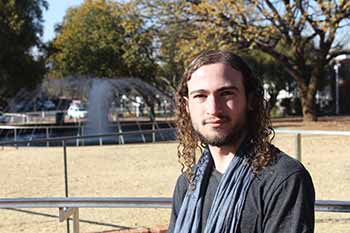Latest News Archive
Please select Category, Year, and then Month to display items
30 October 2018
|
Story Rulanzen Martin
|
Photo Peet van Aardt
 Some of the student writers who contributed to the anthology that tells their stories in Sesotho, isiXhosa, isiZulu, English and Afrikaans.
Some of the student writers who contributed to the anthology that tells their stories in Sesotho, isiXhosa, isiZulu, English and Afrikaans.
How do you transform the higher education curriculum? You involve the exact people the curriculum is intended for. The book, Initiative for Creative African Narratives (iCAN,) illustrates how decolonisation can be achieved through literature for students by students.
iCAN is an initiative by the Centre for Teaching and Learning (CTL) at the University of the Free State (UFS) to mentor students in creative and narrative writing. Under the mentorship of Dr Peet van Aardt, project coordinator, and Ace Moloi, author and UFS alumnus, iCAN Volume 1 was recently launched with 47 short stories written by UFS students.
“The project is a response from the centre for the ever-increasing need for decolonised curricula, steeped in the local cultural perspective of ubuntu,” said Dr Van Aardt.
“This book is an example for how decolonisation can be implemented,” said Prof Francois Stydrom, Senior Director of CTL. The overall aim of the iCAN project is to have the content that materialised from it to be included in the curriculum of first-year students at UFS in the near future.
Book provides multiple voices
Starting in May 2018, CTL presented a series of creative writing workshops on all three of the UFS campuses. “It’s a medium that allows a diverse range of students to express their views and develop their voices as writers,” said Prof Strydom.
It is a form of empowerment, to pass the baton to students to improve the UFS curriculum by writing and publishing their own stories, thereby contributing to larger bodies of knowledge through their lived experiences.
“I believe we as a university need to enable students so that they move away from just being users to becoming contributors to the curriculum,” Dr van Aardt concluded.
Young language Einstein set for Europe
2017-07-10

Willem Carel Brink will be studying in France and Italy
for the next two years as part of his master’s
degree programme
Photo: Rulanzen Martin
German, French, English and even Latin are just a few of the languages known by Kovsies’ own language guru, Willem Carel Brink.
This arty junior lecturer and 2015 Senate and Dean’s medal recipient at the Department of Afrikaans and Dutch, German and French at the University of the Free State (UFS) received the Erasmus-Mundus bursary to conduct his master’s degree under the Erasmus Mundus Master en Cultures Littératures Européennes (CLE) title. He departs for Europe in September. “It is a structured interdisciplinary study which focuses on European literature, culture and other aspects,” Willem says. The subject for his thesis will be determined during the duration of the course.
Two-year course under Erasmus Mundus
The Erasmus CLE master’s is a two-year course which is presented by five partner universities in France, Senegal, Italy and Greece. Students are expected to indicate at which universities they want to study but cannot spend both years at the same university. “France was my first choice, because I know the language – which was a prerequisite for selection,” said Willem. He is fluent in Afrikaans, English, German and French!
“I will spend my second year in Bologna, Italy,” he said. It is therefore also expected that he does an Italian course during the first year to prepare him for the second year in Italy.
Future collaboration with UFS a prospect
Future collaborations between him and the language departments at the UFS are possible prospects for the future when he returns. “What makes this degree especially attractive to me is that it has value in terms of the local environment in the teaching of European languages and literature.”